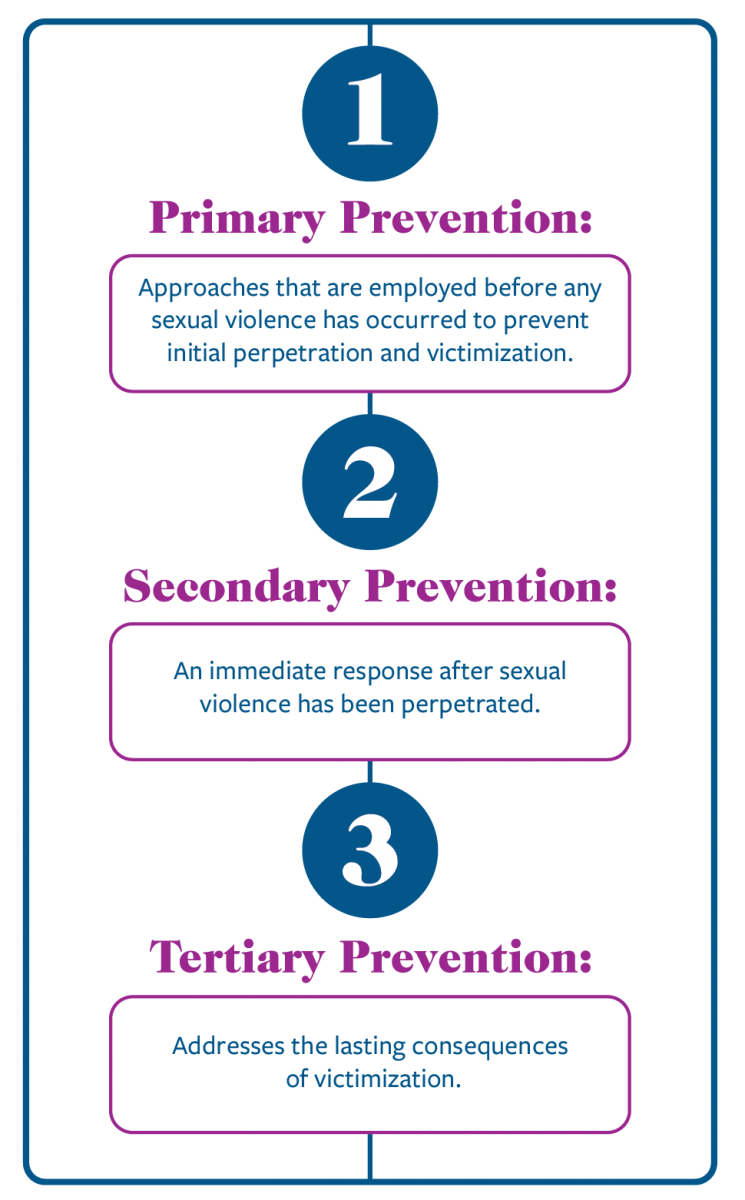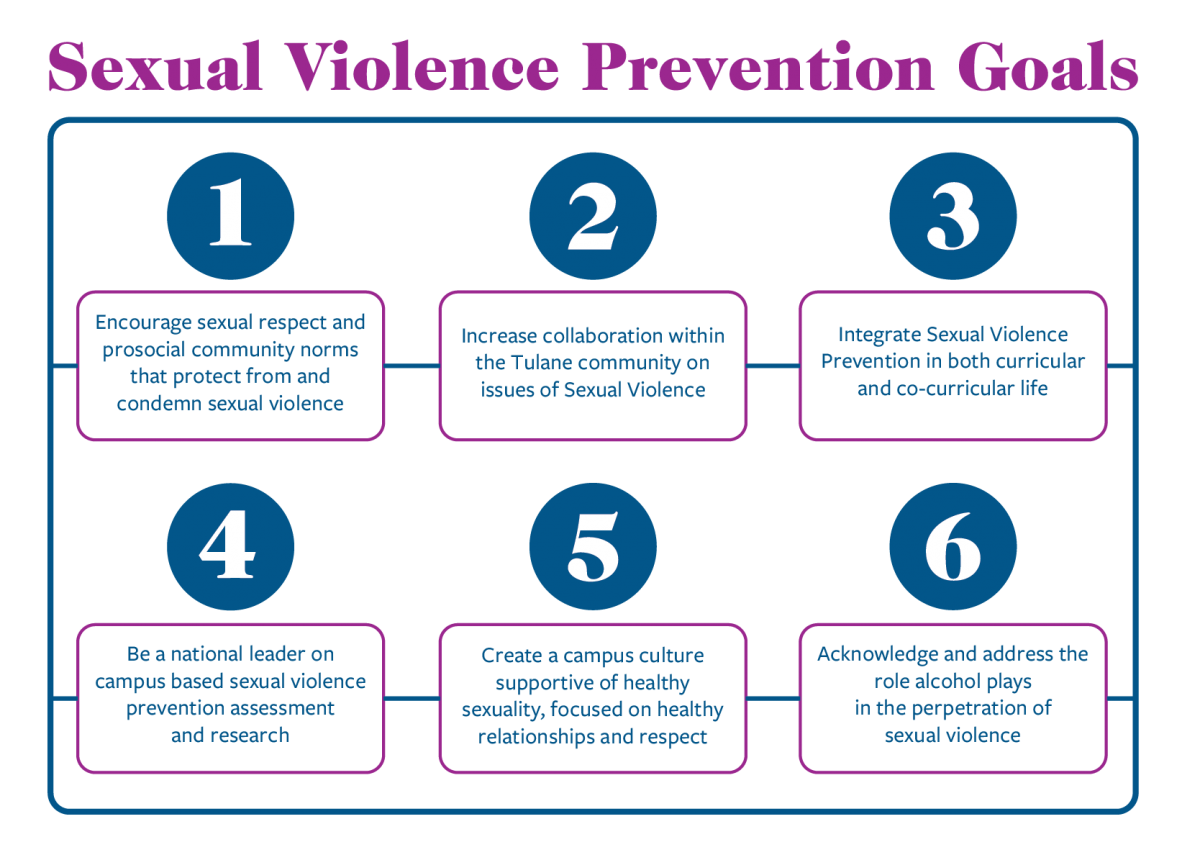All In 1.0 Plan
The plan presented here was greatly informed by contributions by groups and individuals from the Tulane community who were engaged around this topic and the publicly-released 2017 climate survey data. The survey review and feedback and insights shared through the Wave of Change campaign led to an increased understanding of the circumstances and factors that are unique to Tulane and could reduce the perpetration and victimization of students. From this increased understanding, the All In Campaign was launched in 2018 to provide a vision and plan forward for entrenching and expanding sexual violence prevention work here on Tulane’s campus. The All In 1.0 Plan was in effect from fall 2018-spring 2023. The All In 2.0 plan will take effect in fall 2023.

Sexual Violence Prevention refers to efforts intended to stop the perpetration of unhealthy, harmful, dangerous, and illegal behavior and acts, as well as victimization and re-victimization by others (ATSA, 2018). Prevention efforts include developing the attitudes, knowledge, skills, behaviors, and resources necessary to promote individual student and Tulane community health, safety, and wellbeing (ATSA, 2018).
The field of public health prevention defines three levels of prevention in a social or health problem, primary, secondary, and tertiary.
The 2017 Tulane University Climate Survey indicates that sexual violence is a pervasive issue on this campus and is a public health matter that needs to be addressed. The results indicate that 40% of female-identified and 18% of male-identified undergraduate students, and 16% of female-identified and 8% of male-identified graduate students report being victims of sexual assault. Additionally, experiencing sexual violence may not be a one-time occurrence for students. Among undergraduate respondents, 10% of female-identified and 4% of male-identified students report having experienced three or more incidents of rape.
Specific populations of concern include heterosexual females and those who identify as LGBTQ+. More than 20% of heterosexual females report begin victims of attempted rape and 23% report being victims of rape. Among LGBTQ+ students, 33% report being victims of attempted rape and 31% victims of rape. The majority (82%) of victims report that their perpetrator was male-identified. Also, of concern is the use of alcohol and other drugs during these incidents. Most victims indicate that they had used alcohol or other drugs, and that the perpetrator had also used alcohol or other drugs, during the incident. These populations and area of concern may require specific focus.
In addition to a focus on reducing sexual misconduct rates, target factors related to campus climate such as students’ knowledge of sexual consent and perceptions of sanctions for sexual misconduct.
- Consider producing short educational videos on key topics featuring current students.
- Require syllabus statements including the campus sexual misconduct policy and campus resources for survivors. Consider adding a syllabus quiz or other means to encourage students to carefully read syllabi.
Develop course material focused on campus violence reduction from multiple perspectives and weave it through the existing curriculum, such as empowerment and ecological frameworks.
- Offer faculty incentives for developing or integrating this content into their courses (cf. Instructional technology)
- Institute measures to incentivize or otherwise drive students to existing and future courses containing this content.
Engage current Tulane staff, students, and faculty who have had concerns with the climate data response process.
- Students: Form committees and workgroups focused on key issues. Determine specific group tasks and decide procedural outcomes at the outset of group formation. Desired results are to give students leadership and control over the issues, while avoiding a perception that the administration is passing responsibility or blame to students.
- Staff: Increase response coordination across Tulane administrators, staff, and faculty. Develop iterative communication processes where all requested products receive follow-up and . there is clearer communication regarding timelines and action plan steps. Tulane staff members with expertise and positions related to campus violence prevention should hold leadership roles in responding to the climate survey data.
- Faculty: Involve Tulane faculty from units already engaged in study of relevant issues—such as violence prevention, substance abuse, or social norms (e.g., Public Health, Psychology, Social Work, Sociology, and Communications.
Use climate data to determine action plan priorities, campus violence prevention methods, and to determine resources allocated to violence and harassment prevention efforts.
Consider following the Rutgers model for institutional investment, accountability, and long-term commitment to reducing sexual misconduct.
Build additional research and teaching capacity by prioritizing research expertise and teaching experience/interests in areas related to violence prevention during future faculty searches.
Support engaged scholarship among current and future Tulane faculty to help reduce violence on Tulane’s campus en route to more generalizable research (e.g., seed grant program or course buy outs to support pilot data collection for subsequent external grant proposals).
Continue efforts to reduce student high-risk drinking, but also note that these efforts are not to be promoted as or used in place of sexual misconduct prevention measures.
We developed six broad goals to support prevention:

The All In plan makes use of all three levels of intervention, includes objectives, strategies, and tactics, along with aspects that focus on specific groups within our community. The plan includes existing resources and efforts being re-directed, along with new investments for initiatives.
Association for the Treatment of Sexual Abusers (ATSA) Sexual Violence Prevention Fact Sheet
American College Health Association (ACHA): Campus and Sexual Violence Resources
American Association of University Women (AAUW): Ending Campus Sexual Assault Tool Kit
Centers for Disease Control and Prevention (CDC): Violence Prevention
